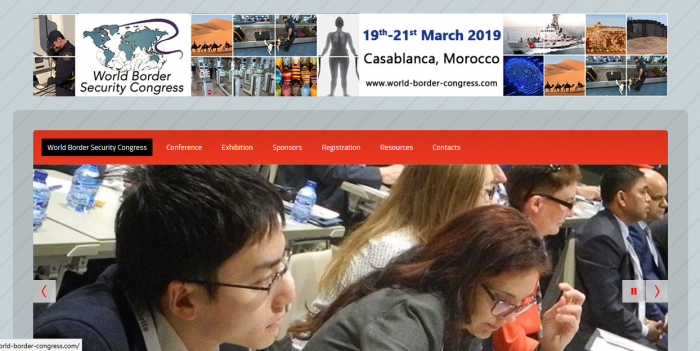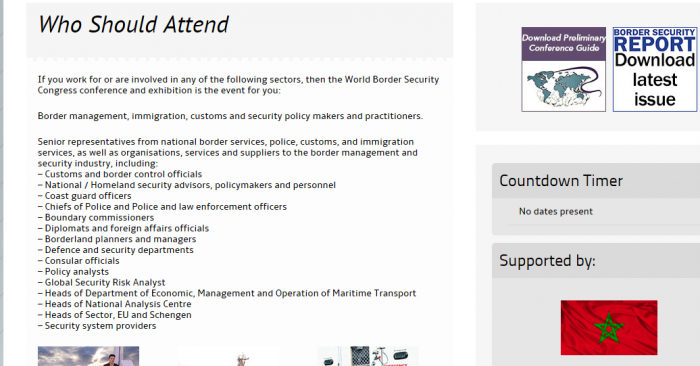



1. Important Links
(1) http://world-border-congress.com/
SPONSORS
(2) https://www.biometricupdate.com
(3) https://findbiometrics.com/
(4) https://www.rapiscansystems.com/en/
(5) https://www.rapiscan-ase.com
(6) https://www.gemalto.com/
(7) https://www.cellebrite.com/en/home/
(8) https://www.sita.aero/
2. Giving Some Context
CLICK HERE, for the UN’s response to repatriating terrorists.
CLICK HERE, for Border Security Report.
As a bit of a side note: Morocco is also where the UN Global Migration Compact was signed on December 10, 2018.
Also, I cannot be the only one who thinks such an organization is creepy as hell. Why is there a “global border management”? What happened to countries making their own decisions?
3. Who Are These People?
“The annual gathering of the international border management and protection community will take place in Casablanca, Morocco on 19th-21st March 2019.
Co-hosted by the Ministry of Interior and General Secretariat for Migration and Border Surveillance of Morocco (Directeur de la Migration at de la Surveillance des Frontieres), the World Border Security Congress is delighted to be welcomed back to the North African country and economic hub of the region.
The 2019 World Border Security Congress will see the largest international gathering of border security and management policymakers and practitioners from more than 50 countries gather for the 3 day meeting for some great discussions, meetings, workshops and networking with colleagues and peers from the global border security community.”
Okay, this seems to be a globalist love-fest.
From Their Main Page
Current Border Security Challenges:
– Migration Crisis Tests European Consensus and Governance (1)
– Migrants and refugees streaming into Europe from Africa, the Middle East, and South Asia (2)
– Big Business of Smuggling Enables Mass Movement of People for Enormous Profits (3)
– Climate Change and Natural Disasters Displace Millions, Affect Migration Flows (4)
– Europe and the United States Confront Significant Flows of Unaccompanied Child Migrants (5)
– Tackling Southeast Asia’s Migration Challenge (6)
– ISIS threatens to send 500,000 migrants to Europe (7)
– Border Skirmishes Resonate in National Domestic Politics (8)
– Women’s Labour Migration from Asia and the Pacific (9)As we see the continued escalation of the global migration crisis, with mass movements of people fleeing the war zones of the Middle East as well as illegal economic immigration from Africa and elsewhere, international terrorism(10) shows every sign of increasing, posing real threats to the free movement of people.
The world is expected to see a continuation of the migration challenges for the border management and security community, as little sign of peace and security in the Middle East is apparent and porous borders in Africa continue to provide challenges.
International organized criminal gangs and human and drug trafficking groups exploit opportunities and increasingly use the internet and technology to enhance their activities.
Controlling and managing international borders in the 21st Century continues to challenge the border control and immigration agencies around the world. It is generally agreed that in a globalised world borders should be as open as possible, but threats continue to remain in ever evolving circumstances and situations.
Advancements in technology are assisting in the battle to maintain safe and secure international travel. The border security professional still remains the front line against these threats.
This reads like it was brought to you by the same people who pushed the UN Global Migration Compact. But let’s go through this list a bit. Starting with your points list:
1/ Testing European consensus and governance? There “is” no European consensus, unless one argues that Europeans are unhappy with what their governments have brought them
2/ Yes migrants ARE streaming into Europe from Africa, the Middle East and Asia. But you promote open borders, which makes this problem all that much worse.
3/ True, smuggling people IS big business. However, you fail to mention that mass migration, and promoting mass migration is also big business, and it has much the same effect (legal or not).
4/ Climate change: everyone’s favourite boogeyman. Mass migration has nothing to do with welfare and handouts that economic migrants can get by moving to the West and pretending to be refugees.
5/ Regarding all of these “unaccompanied child migrants”, it would be interesting to know just how many of them are actually children. This seems to be a widespread scam.
6/ Yes, Southeast Asia has a migrant crisis as well. However, mass migration to the west is not the solution. All it will do is drain Western nations and cause their collapse.
7/ ISIS threaten to sends 100,000 fighters to Europe, but globalist organizations like the UN say that we must be compassionate. They also don’t want countries rejecting “citizens” who fight for ISIS.
8/ If there are border skirmishes going on, all the more reason to shut down borders and heavily restrict, if not outright ban people from certain countries.
9/ Of course, it wouldn’t be complete without the feminist card.
10/ Strengthen borders to stop this from coming here.
11/ Technological advancements? Now that sounds interesting. Seems these people don’t actually want to PREVENT bad things from happening, rather they wish to PROFIT from it happening. In fact, 2 major sponsors: FIND BIOMETRICS, and BIOMETRIC UPDATE, could see a huge surge in business caused by mass migration.
Here is a quote from the report:
“Governments around the world need to continue to invest in their border security, as a wide range of threats, such as combating terrorism, controlling the movement of goods and monitoring personnel across international borders, continue to pose challenges requiring round the clock monitoring.”
What a coincidence: the sponsors of this conference are selling just the tools that governments will need to secure their borders.
This conference is sponsored by companies that sell:
A/ Biometric services
B/ Security screening devices
C/ Digital and mobile technology
Is it much of a surprise that mass migration would be PROMOTED by a group and its sponsors who will end up PROFITTING from it? Not really.
World Border Congress Has Sympathy For ISIS Fighters
From THIS REPORT:
“Despite the fact that it is illegal to make an individual stateless, there is strong public opinion in most countries that supports the idea of leaving them to fend for themselves, and it easy to understand why. Whatever prison sentences they receive and deradicalisation they undergo, they will have to be regarded as a potential threat for the remainder of their lives.
And of course, it is certain that at least some of them will go on to attempt to commit an atrocity sometime in the future.
So, for most people, stopping their return seems like plain common sense. But would it be the wisest choice? If you leave them stateless, what will happen to them and where will they go?
It is fairly certain that the Kurds won’t want to be responsible for them for any prolonged period. And the Turkish authorities certainly won’t want to inherit the problem. The most likely outcome is that they will gradually be quietly released or abscond and use underground trafficking routes, new documents and new identities to either return to Europe or go elsewhere to carry on the fight.”
This group glosses over legitimate security risks posed by mass migration. However, the risks that “do” exist can be managed by purchasing services from the conference’s many sponsors.
This is disturbing. Want to know what is actually worse?
4. UN Response To “Foreign Fighters”
Again, the report is available here.
3. The movement of people for the purposes of joining and supporting terrorist groups as well as their return to their countries of origin poses serious challenges to States in their efforts to prevent acts of terrorism. It is crucial that States adopt comprehensive long-term responses that deal with this threat and manage the return of fighters, and that in doing so they comply with their obligations under international human rights law. States have an obligation to protect the lives of individuals subject to their jurisdiction, and this includes the adoption of effective measures to counter the threat posed by foreign fighters.
13. In a limited set of circumstances, States may also take measures to temporarily derogate from certain international human rights law provisions. As noted by the Human Rights Committee, measures derogating from the provisions of the International Covenant on Civil and Political Rights must be of an exceptional and temporary nature. Two fundamental conditions must be met: the situation must amount to a public emergency which threatens the life of the nation; and the State party must have officially proclaimed a state of emergency. The obligation to limit any derogations to those strictly required by the exigencies of the situation reflects the principle of proportionality which is common to derogation and limitation powers.
16. International humanitarian law is also known as the law of war or the law of armed conflict and is applicable to both situations of international or non-international armed conflicts. These rules are enshrined in the four Geneva Conventions and their Additional Protocols, as well as in customary rules of international humanitarian law. International humanitarian law is a set of rules which seek, for humanitarian reasons, to limit the effects of armed conflict. It protects persons, civilians, who are not or are no longer participating in the hostilities as well as fighters hors de combat and restricts the means and methods of warfare.
18. States have used different measures, whether legislative, administrative or operational, to prevent the departure of foreign fighters to conflict areas as well as to prevent their return. These could include travel bans, the seizure, retention, withdrawal and non-renewal of passports or identity cards, the stripping of citizenship, restrictions on travel or entry to territory and various types of house arrests or preventive detention. All of these measures have a serious impact on a number of fundamental human rights, including the rights to personal liberty and freedom of movement. They also raise a number of serious due process concerns if, for example, decisions are taken following secretive proceedings, in absentia or on the basis of vaguely defined criteria without adequate safeguards to prevent statelessness.
The World Borders Congress states that it believes that fighters who go abroad have rights. It implies that the safety of the host populations must be “balances” against the rights of terrorists themselves. From the above passages, the UN is clearly on board with this proposal.
The UN is totally fine with mass migration and returning terrorists for IDEOLOGICAL reasons.
Sponsors of World Borders Congress is fine with mass migration and returning terrorists for FINANCIAL reasons.
A partnership made in hell.
Discover more from Canuck Law
Subscribe to get the latest posts sent to your email.
